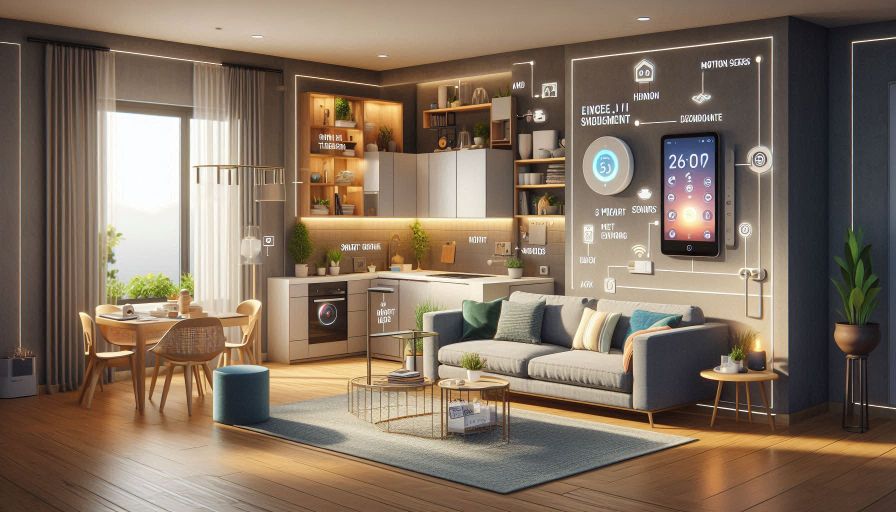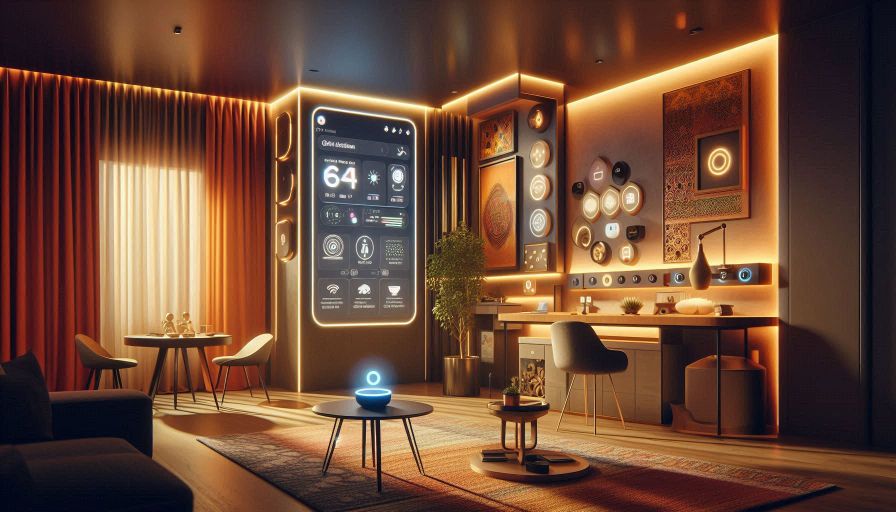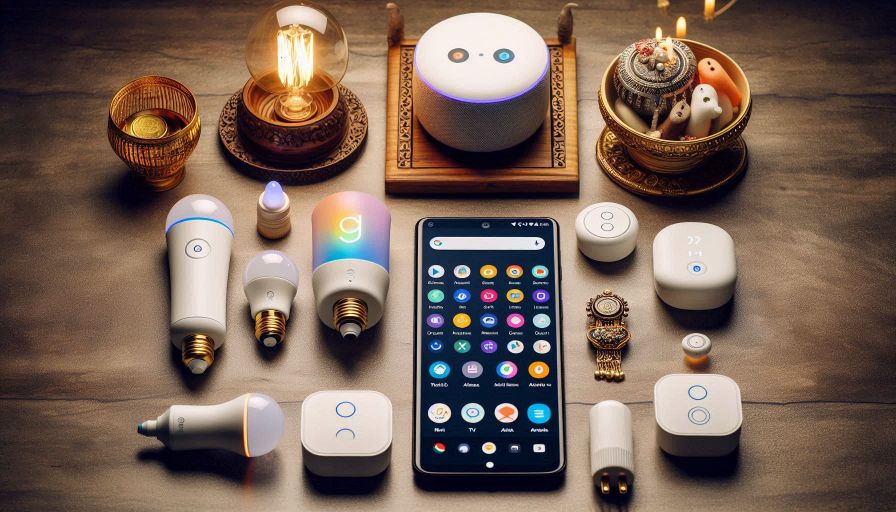Smart homes using AI in India opening up new possibilities in 2025 by making daily life more efficient, secure, and connected. Discover how AI driven devices are transforming modern Indian homes with automation, energy savings, and convenience.
Table of Contents
Introduction: The Rise of Smart Homes in India

In recent years, the concept of smart homes has moved from luxury to lifestyle especially in India. With rapid digitalization, affordable devices, and increasing awareness, Indian households are embracing AI powered smart home technology like never before.
Artificial Intelligence (AI) is enabling homes to become more responsive, efficient, and secure. From voice assistants to automated lighting, smart appliances to intelligent security cameras technology is changing how people live and interact with their homes.
The shift is not just about convenience; it’s about energy savings, time management, and a better quality of life. Whether it’s a working professional in a metro city or a retired couple in a tier 2 town, smart home solutions are becoming both accessible and practical.
In this blog, we explore how smart homes using AI in India are opening up new possibilities, the technologies behind them, and what the future holds for Indian living spaces.
What Are Smart Homes and How Are They Powered by AI?
A smart home refers to a living space that is outfitted with devices that can be managed remotely or automatically via a smartphone, tablet, or voice command. These devices utilize technologies such as sensors, internet connectivity, and, most crucially, Artificial Intelligence (AI) to understand user behavior and enhance home functionalities.
AI elevates a standard smart home into a smart ecosystem capable of thinking, adapting, and making independent decisions. It surpasses basic automation by examining patterns and implementing real-time modifications.

Here’s how AI powers smart homes
Personalized Automation: AI observes your routines such as when you rise, adjust lighting, or modify room temperatures and automates these tasks without requiring manual intervention.
Voice Recognition & Control: With AI assistants like Alexa, Google Assistant, and Siri, users can manage appliances, play music, or receive news updates through straightforward voice commands.
Predictive Maintenance: AI can identify early indicators of appliance malfunctions and send notifications before a failure occurs.
Energy Optimization: AI driven thermostats and lighting systems can minimize electricity consumption by adjusting according to occupancy and weather conditions.
Security & Surveillance: Smart cameras and motion detectors leverage AI to recognize threats and alert homeowners immediately, even differentiating between humans, animals, and vehicles.
In summary, AI infuses intelligence, adaptability, and efficiency into home management making life simpler, safer, and more economical.
Key Technologies Powering AI Driven Smart Homes
The foundation of any smart home is built upon the technologies that fuel its intelligence. Across India and globally, numerous advanced innovations collaborate to establish smart, responsive, and efficient living spaces.
Here are the essential technologies that enable AI-driven smart homes

- Internet of Things (IoT)
Links devices and appliances throughout your home.
Facilitates communication between devices such as lights, thermostats, fans, security systems, and kitchen gadgets.
Works alongside AI to collect and relay data for more informed decision making.
- Artificial Intelligence (AI) Algorithms
Artificial Intelligence analyzes user actions, predicts requirements, and streamlines daily activities.
Adapts to your preferences over time from modifying temperatures to recommending lighting settings.
Drives voice assistants and facial recognition features in smart systems.
- Voice Assistants
Devices like Amazon Alexa, Google Assistant, and Apple Siri serve as central control points for managing smart homes.
Provide hands free access to information, entertainment, and home automation functions.
- Smart Sensors
Employed in motion detection, temperature control, humidity management, and occupancy sensing.
Initiate actions such as turning lights on/off, adjusting air conditioning, or automatically locking doors.
- Cloud Computing
Houses and processes extensive data from smart home devices.
Guarantees remote control access from any location worldwide.
Facilitates software updates and enhancements over time.
- Mobile Apps
Centralized control systems accessible via smartphones.
Enable you to oversee, plan, and control smart devices from almost any location.
Collectively, these technologies empower AI driven homes to function effortlessly and improve daily living through intelligence and automation.
Smart Homes Using AI in India Opening Up New Possibilities in Daily Life
The increasing use of AI driven smart homes in India is changing the way individuals live, work, and engage within their environments. These residences have evolved beyond mere luxury; they now embody practical innovation, energy efficiency, and improved comfort.
Here’s how AI enabled smart homes in India are creating new opportunities in everyday life:
- Customized Living Experience
AI tailors itself to personal habits activating lights, adjusting AC settings, or playing music according to your schedule.
Provides personalized comfort for every family member.
- Enhanced Energy Efficiency
Smart devices automatically modify energy consumption based on occupancy and the time of day.
Aids in lowering electricity expenses, which is particularly beneficial in Indian urban regions with elevated energy prices.
- Improved Security
AI-driven surveillance systems utilize motion detection, facial recognition, and immediate alerts to ensure home safety.
Integration with smartphones enables 24/7 remote monitoring.
- Better Care for the Elderly and Children
Smart homes support senior citizens with voice commands, automated lighting, and emergency notifications.
Parents can oversee and secure their children through smart locks and indoor cameras.
- Voice-Controlled Convenience
From activating fans to ordering groceries, smart speakers facilitate a hands-free and stress-free lifestyle.
Ideal for busy Indian families juggling work, children, and daily responsibilities.
- Remote Access and Control
Whether at work or on holiday, you can control home devices remotely via mobile applications.
Provides peace of mind and flexibility to your daily routine.
These features prove that AI isn’t just improving life it’s redefining how we live. With growing demand in cities like Bengaluru, Mumbai, Ahmedabad, and Delhi, India is moving quickly toward a more connected, intelligent future.
Real-World Smart Home Illustrations in Indian Cities
With smart home technology becoming increasingly available, practical implementations in India are growing swiftly. Major urban areas are experiencing a significant uptick in AI-powered home solutions being embraced by tech-savvy residents, builders, and even residential complexes.
Here are several instances of how AI-driven smart homes in India are already in operation:
1. Bengaluru: The Epicenter of Intelligent Living
Numerous apartments in Bengaluru now provide AI-based illumination, climate regulation, and integrated security features as part of their basic offerings.
Homeowners rely on voice-controlled assistants, smart locking systems, and energy-monitoring devices to enhance their daily routines.
2. Mumbai: AI Integration in High-Rise Developments
Luxury residences in Mumbai come equipped with motion detectors, automated window coverings, and AI-managed air conditioning systems.
Developers such as Lodha and Hiranandani are promoting “Smart Residences” with advanced building management systems.
3. Ahmedabad: Enhanced Security in Affordable Homes
In emerging neighborhoods of Gujarat, many middle-income families are adopting AI-enhanced CCTV systems, smart doorbells, and appliances that can be controlled remotely.
Products such as Wi-Fi-enabled switches and smart outlets are gaining traction because of their affordability and user-friendliness.
4. Hyderabad & Pune: Tech in Secured Communities
Gated communities are employing centralized AI systems to oversee energy consumption, water usage, and visitor management.
The incorporation of smart alarms and community-focused AI notifications provides an additional layer of security and convenience.
5. Delhi NCR: Tailored Smart Home Automation Solutions
Residents are investing in AI-driven automation solutions from companies like Wipro, Schneider, and Oakter.
These homes showcase automated curtains, voice-activated lighting systems, and real-time usage monitoring.
Challenges in AI Adoption Across Indian Households
While the advantages of AI-driven smart homes in India are clear, numerous practical obstacles continue to hinder widespread acceptance particularly among middle- and lower-income families.
Let’s examine the primary challenges that must be overcome:
1. High Initial Cost
The price of smart home devices and their installation is quite high.
Many Indian households view these systems as unnecessary luxuries instead of valuable long-term investments.
2. Limited Digital Literacy
A significant portion of the population remains unfamiliar with AI, IoT, and automation technologies.
This lack of familiarity fosters resistance to embracing new technologies, particularly among older individuals.
3. Internet Connectivity Issues
Smart systems depend heavily on reliable, high-speed internet access.
In numerous rural and semi-urban regions of India, connectivity is often inconsistent or entirely lacking.
4. Privacy and Data Concerns
Many potential users are reluctant to adopt AI-enabled devices due to worries about data collection, voice recording, and cybersecurity threats.
The absence of clear regulations regarding AI ethics and smart home data privacy exacerbates these fears.
5. Limited After-Sales Support
Most smart home brands in India still do not have a robust customer support network, particularly outside major urban areas.
Users encounter difficulties with device updates, troubleshooting, and maintenance.
6. Compatibility Issues
Devices from different manufacturers might not always function together smoothly.
This leads to confusion and restricts the potential for a fully integrated smart home experience.
Despite these challenges, the smart home market in India is rapidly advancing. As costs decrease, awareness increases, and infrastructure develops, these barriers are anticipated to diminish in the years ahead.
The outlook for AI-Driven Smart Living in India is exceptionally bright.
With swift advancements in AI, IoT, and 5G technology, smart living is set to transition from a luxury to a common lifestyle in Indian homes.
Let’s delve into the unfolding future of AI enhanced smart homes in India:
1. Cost Effective Smart Devices
Indian technology firms and startups are developing affordable smart home devices designed to meet local needs.
These more budget-friendly options will help close the gap in smart living adoption between urban and rural areas.
2. Collaboration with Government Smart City Initiatives
The Indian government’s Smart Cities Mission encourages AI driven urban planning and housing solutions.
Smart homes will be integral to digitally connected and sustainable urban living environments.
3. Regional AI Assistants
AI voice assistants are being created in various Indian languages, enhancing usability and accessibility for a broader audience.
This advancement will boost the adoption of smart homes in tier 2 and tier 3 cities.
4. Rise of Rental and Builder Integrated Smart Homes
Real estate developers are starting to include pre-installed AI systems in new apartment developments.
Even rental properties might soon include standard smart technologies such as app controlled lighting and smart locks.
5. Sustainable and Energy Efficient Designs
AI will significantly contribute to monitoring and minimizing energy waste, supporting India’s clean energy objectives.
Intelligent homes will support eco friendly building practices and promote sustainable city development.
6. Improved AI Learning and Customization
Future systems will not only react but also anticipate and tailor every aspect of your home experience from meal suggestions to health tracking.
The future unmistakably indicates that AI-powered smart homes in India will become a part of daily life providing convenience, control, and a connected lifestyle for millions.
Real Life Example: An AI Enhanced Smart Home in Pune Revolutionizing Daily Life
To grasp the tangible effects of smart home technology, let’s examine a real world instance of how AI-driven smart living is improving the lives of an Indian family.
Case Study: The Mehta Family in Pune
The Mehta family a working couple with two kids resides in a 3BHK apartment in Pune. In 2023, they opted to transform their home into a smart AI enabled environment. Their configuration features:
Smart lighting and motion sensors installed in every room
Voice assistant integration (Google Nest) for managing lights, fans, and appliances
A smart security system equipped with motion detection, facial recognition, and immediate mobile notifications
An AI driven thermostat that modifies temperature according to outdoor conditions and daily habits
Smart plugs and switches for remotely controlling geysers, TVs, and kitchen devices
🖌️ Outcomes After 6 Months
🥕 25% decrease in monthly electricity expenses
🥕 Enhanced home security and peace of mind, particularly during travel
🥕 A more convenient lifestyle with voice control and scheduling options
🥕 Boosted productivity as household chores became automated
“We never imagined a smart home could be within our budget,” states Mr. Mehta. “However, AI technology has simplified our lives, making them safer and smarter without being overwhelming.”
This case illustrates that AI enabled smart homes in India are not merely a futuristic aspiration they represent a practical, scalable reality.
Comparison Table: Traditional Homes vs AI Powered Smart Homes in India
| Feature | Traditional home | Ai powered smart home |
| Energy efficiency | Manual control, often wasteful | Optimized with ai based automation and sensors |
| Security system | Basic locks, manual surveillance | Smart lock , real time alert, facil recognition |
| Appliances control | Manual operation | Remote and voice control via mobile aap or ai |
| Cost over time | Lower initial cost, higher running cost | Higher initial but save money long term |
| Convenience | limited automation | Highly convenient and customizable lifestyle |
| User accessibility | No integration across devices | Centralized control of all smart devices |
| Environment impact | Often efficient energy usage | support sustainable and green living |
| Maintenance Alert | Manual chack required | Automatic alers for filter changes, maintenance, etc … |
conclusions
Conclusion
AI driven smart homes in India are rapidly evolving beyond a mere trend they are revolutionizing daily life. With enhanced energy efficiency, increased security, and greater convenience, these homes provide tangible advantages. As technology becomes increasingly accessible, AI-enhanced living is poised to expand throughout Indian cities and towns.
The future of life in India is smart, connected, and powered by AI.
Frequently Asked Questions (FAQs)
1. What is a smart home using AI?
A smart home using AI is a residence equipped with devices that can learn, automate, and adapt to your habits — like lights, appliances, and security systems — using artificial intelligence and internet connectivity.
2. Are smart homes popular in India?
Yes, smart homes are gaining popularity in India, especially in cities like Bengaluru, Mumbai, and Delhi. Growing awareness, lower device costs, and tech-savvy homebuyers are driving this trend.
3. What are the benefits of smart homes using AI in India?
Some key benefits include:
- Lower electricity bills
- Better security
- Hands-free control of devices
- Convenient living experience
- Support for elderly and children
4. Is it expensive to set up a smart home in India?
Initial setup can be costly, but prices are coming down. Many Indian families now start with affordable smart plugs, lights, and cameras, then gradually expand their system.
5. Can I control a smart home remotely?
Yes, most AI based smart home systems can be controlled via smartphone apps from anywhere letting you manage lighting, security, and appliances even when you’re away.